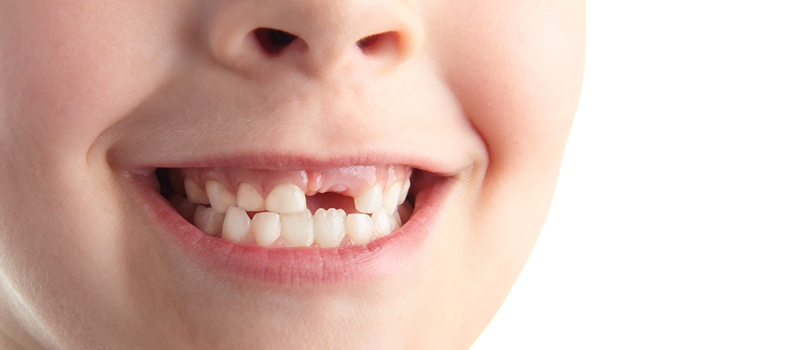It’s a rite of passage that all kids and parents alike go through. At some point or another – multiple times, in fact – baby teeth suddenly become wobbly loose. When baby teeth fall out at a relatively early stage, the whole thing passes pretty quickly and with minimal distress. The reason being that if the child in question is young enough, they’ll have no idea what’s happening.
As children get a little older, losing baby teeth becomes an entirely different experience. It’s typically from the age of six that children begin losing their baby teeth, though it can happen much sooner or later. Baby teeth tend to fall out at a rate of 3 to 4 per year, with most kids having lost all their baby teeth by the age of 12. Once again however, there are always exceptions to the rule – such guidelines are not to be taken as gospel.
The loss of baby teeth is something all parents and kids have to go through, but this doesn’t mean all parents know how to deal with it. So to help shed a little light on this inevitability of childhood, what follows is a brief overview of just a few tips and insights from the pros:
Is it scary for kids to lose baby teeth?
Interestingly, the vast majority of kids really don’t seem to care. In fact, they often relish the opportunity to waggle and play with loose teeth with their fingers and tongue alike. The fact that losing baby teeth is usually accompanied by no pain whatsoever eliminates much of the fear factor.
For obvious reasons, fear of losing baby teeth can also be reduced by bringing the Tooth Fairy into the equation. When kids know they’ll be rewarded for losing their teeth, it ends up becoming something they actually look forward to.
How about brushing teeth with a loose tooth?
When the mouth contains one or more loose baby teeth, extra care and caution are needed when brushing. You aren’t going to want to tackle things gung-ho with a powerful electric toothbrush and intense water flosser, for pretty obvious reasons. But at the same time, it’s important not to let health and hygiene suffer for the sake of a loose tooth.
If there’s no pain or discomfort, it really doesn’t matter if the tooth decides to fall out while brushing. That said, the primary danger that accompanies teeth falling out while brushing is choking. When it comes to younger children in particular therefore, supervised brushing is particularly important when loose teeth factor into the equation.
What if my kid swallows a baby tooth?
There are far too many rumours and untruths doing the rounds, when it comes to the consequences of swallowing baby teeth. The only thing you really need to know is that absolutely none of them are true. Ask any doctor or dentist and they will tell you that swallowing a baby tooth is completely harmless. The tooth will simply pass through the child in the normal way, in its own time.
If the tooth in question was damaged and had particularly sharp points or edges, preventing swallowing becomes all the more important. If in any doubt, speak to your doctor or dentist as soon as you suspect that the tooth may have gone ‘missing’ the wrong way.
Do the front teeth usually fall out first?
Statistically speaking, kids are more likely to lose their bottom teeth at the front first, followed by the top ones and finally the back ones. Nevertheless, the whole thing happens completely reversed for countless kids and so there really is no rightor wrongway for it to happen. There’s nothing that can really be done to predict or prevent baby teeth from falling out as they do, so there’s no point worrying about if and when certain teeth will fall out.
That said, if there appears to be anything unusual about the way your kids’ teeth are coming loose and falling out, it’s a good idea to check with a dentist, just to be sure. It’s highly unlikely there’s anything wrong, but it’s still a good idea to check.
Is it okay to yank a very loose tooth?
Realistically, there is never really any need to yank out even the loosest of baby teeth. The reason being that when a tooth becomes so loose it appears prime for removal, it will probably take care of the removal process itself in no time at all. The problem being that regardless of how loose the tooth may be, it’s difficult to tell whether or not it will hurt to pull it out.
You can pretty much rest assured that your kids’ curiosity and general restlessness will result in even the most modestly loose baby teeth falling out in no time at all. You probably won’t have the chance to get anywhere near a very loose tooth – they’ll have it yanked out and under the pillow before you know anything about it.
Does it hurt to lose baby teeth?
Last but not least, when baby teeth start getting loose and fall out on their own, there is usually no pain involved whatsoever. Even if there’s a tiny bit of blood, chances are the child won’t feel any pain or discomfort. Nevertheless, if baby teeth are removed prematurely, this can cause pain and slightly more profuse bleeding.
As with all things, it’s better to be safe than sorry. If your child appears to be suffering any kind of moderate to severe pain or discomfort when their baby teeth come loose, arrange an appointment with your dentist as soon as possible. If nothing else, they will at least be able to put your mind at rest by ensuring everything is OK.
